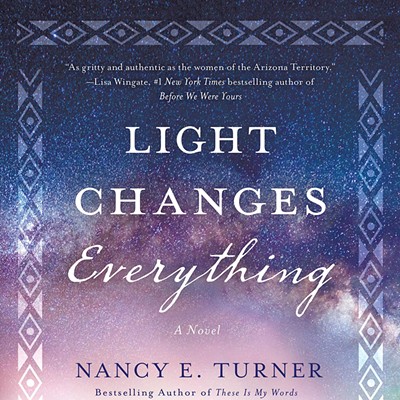He grasped early the fiscal opportunities implicit in "charitable" fundraising. ("All the funds went to children," he told his mother when she questioned his profitable, vague "March for Hunger." "Yes. They did," he said, pocketing a hundred-some bucks.)
He idolized Andrew Jackson as pictured on the $20 bill, admiring "the vertical dart between the brows, the jutting chin, the narrow mouth ... his composure in the face of the trivial." The all-seeing eye on the $1 bill soothed his anxieties.
Lydia Millet's newest protagonist, "T.," is a perfectly minted capitalist. And How the Dead Dream is perfectly minted satire.
This is Millet's sixth novel--each one different, this one already acclaimed. Born in Boston in 1968, raised in Canada, Millet did a stint in the UA writing program, completed a master's in environmental science at Duke and settled in Tucson, where she's proving that literary fiction doesn't have to be domestic-realism tedious, and that political fiction doesn't have to preach.
That said, the plot premise of this novel is nothing if not weird: Successful young developer T. suffers a personal crisis and begins to break into zoo exhibits at night, where he sleeps in the enclosures of endangered animals.
The only child of a devoted Catholic mother and a distant, advertising-manager father, T. discovers early that the key to the Midas touch lies in steady "effort and control," in knowing people's motivations and how to exploit them. Rational, distant and intelligent, he becomes a student of financial opportunity. In school, he "befriends" a social outcast, extorting a weekly portion of the boy's allowance to "protect" him from hazing jocks ... whom he in turn scams. In college, while secretly day-trading stocks, he discovers the benefits of networking by proving himself a reliable father figure to his beer-bombing fraternity brothers. On the basis of that network, T. makes his first million-dollar profit only months out of college and launches a career in land development.
But the pins beneath this young believer in the infinite power of free will, independence and capital get pulled out by a series of events. First, his father drops out of sight, and his mother shows up on his doorstep. Secondly, out of surprising guilt for hitting a coyote on a road, he adopts a dog. Then, in close succession, he falls in love, finds his father, loses his lover and escapes into sleep.
He initiates his nighttime zoo break-ins when he's finally able to drag himself awake.
Millet feeds us tidbits of theme. She serves up her dream motif in the voice of T.'s runaway dad: "Did you ever have a dream so real it felt like you were awake? ... What if one day, you woke up and you realized your whole life had been a dream like that?" She suggests it in young T.'s perceptions of old men who die as stupid--and unaware of their stupidity--as they were as young men. She constructs scenes that imitate dream experiences--the sensations of paralysis, of heaviness and lassitude in the face of threat. She dresses money in the robes of religious ritual. She conflates the internal with the external and lets the visceral impinge on the intellect.
Millet reveals her central issue--the tragedy of the loss of biological diversity--by confronting a teachable character with the power of loss--but she never smacks a moral upside the reader's head.
With generous wit and deft timing, just when things might begin to feel a bit serious, she mediates with a bit of humor. T.'s mother has a near-death experience, for example, "But it was bad, very bad." Instead of heaven as she'd pictured it, his mother found herself in the International House of Pancakes.
"I thought," she cautions T. about the afterlife, "it would be more expensive than that."
Though T. lives in Southern California, Millet's settings will feel familiar to local readers. The retirement community he develops in the California desert has all the charm of places we know--acres of fake Santa Fe-style buildings interspersed with golf courses and communal rec centers. The Caribbean resort he's begun work on can be visualized by the growing contingent of Tucson folks with ties to Belize. The gleeful abandon with which T. uproots native mangrove trees would horrify Sonoran denizens who've witnessed bulldozers blade the desert.
Millet takes T. on a jungle trip at the end of How the Dead Dream and leaves him there bizarrely and ambiguously. Think "sleep" again.
Word is that this is the first in a trilogy. This reader, for one, is anxious to return to Belizean mangroves, howler monkeys and jaguars in the next book.








